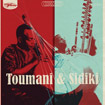Perceptive Travel World Music Reviews
July 2014 - By Graham Reid
In this issue: a wonderfully helpful introduction to Indian classical traditions (and beyond), refugees come home to Sierra Leone, griots get political but polite, and klezmer from Britain to make you dance and smile.
The Rough Guide to Indian Classical Music
Various Artists
We say: Traditions that never sounds old.
The "world music" section of music stores and download sites are awash with crossover music or new takes on old forms. So it's refreshing to see this introductory collection to the complex but compelling art form that is Indian raga. And you can't argue with a selection which includes the late Pandit Ravi Shankar (on a sprightly dhun), santoor master Shivkumar Sharma, legendary father and son tabla players Allah Rakha and Zakir Hussain, sitar virtuoso Vilayat Khan . . .
As a single-disc introduction — from sitar to santoor, violin to vocalists — this could hardly be bettered, especially given the Sharma track "Ahir Bhairav" comes from his classic '67 "Call of the Valley" album with flute player Hari Prasad Chaurasia and guitarist Brijbushan Kabra. And the dueling Rakha/Hussain piece is a thrilling live recording from a cornerstone collection of tabla music. Important and enjoyable music, and — aside from the 17 minute "Raga Chhaya Nat" by sarod player Amjad Ali Khan at the end — the average time of the pieces is an easily digestible seven minutes. An ideal introduction with short but pointed explanatory notes, and a bonus disc which is a standalone gem. It is Debashish Bhattacharya's "3:Calcutta Slide-Guitar" from 2006 which took his distinctive playing to a global audience.
An essential budget-priced double set, especially if you've never ventured here before.
Libation
Sierra Leone's Refugee All Stars
We say: Pour yourself some libation and celebrate these survivors.
The decade-long civil war in Sierra Leone which only ended in 2002 made many people refugees, among them the musicians here who formed the Refugee All Stars in 2004. They had a wonderful documentary made about them in 2005 and have continued to record intermittently since their debut Living Like a Refugee in 2006. This, their fourth album, marries Afro-shuffle beats with reggae ("It's So Sorry", the groove-riding "Rich But Poor"), upbeat juju guitar dance-pop ("Chaimra", "Ghana Baby"), downhome folksiness, a few songs in English, and a classy production by American Chris Velan, who also did the job on their debut.
Given they have been together for a decade now and survived privation and dislocation, there is a predominantly celebratory feel here which is utterly infectious, but there are also messages about what is important in life ("Money No Do").
Very, very hard not to be swept up by this one.
Toumani & Sidiki
Toumani Diabate and Sidiki Diabate
We say: Father and son from Mali make nice, but sometime only nice.
While many world music critics have been in hyperbolic overdrive about this pairing of the undeniably gifted young kora player Sidiki Diabate with his father Toumani (an unequivocally accepted genius, the pre-eminent kora player of our time and a griot with about seven centuries behind him), there might just be a dissenting opinion. Beyond the undeniable cachet of the protagonists it's this: as exceptional as some of these 10 pieces are (and the considered "Claudia and Salma" is truly lovely, its subjects are the daughters of Diabate's manager) there is considerable musical middle-ground occupied here. Despite many of the titles referring to important socio-political figures in Mali, the uplifting and beautifully flighty pieces don't possess gravitas for those beyond the region.
For example, "Toguna Industries" refers to a company which moved street rubbish to the outskirts of the capital Bamako after the 2012 coup. Quite how this romantically thoughtful music conveys that to outsiders is beyond my comprehension.
More affecting, however, are the aching "Lampedusa" named for the Italian mid-Mediterranean island that is the destination for so many African refugees, and the stately "Bansang," evoking the town in Gambia where Toumani's father learned to play.
This is an exceptionally beautiful and genealogically important album, and of course it is in the nature of griots to deal with the issues of the day . . . but at another level it's also just a record, so those at a distance from its socio-political and cultural import should be forgiven for just being seduced by its surface beauty. Again by way of example, "Rachid Ouiguini" named for the Algerian scholar is stunning, but in an archetypal Mali-meets-crossover flamenco way.
Beyond the title references (aside from those who care to go beyond them) this lovely album may not be quite the political stake-holder some Western champions think it is.
Wild Goats and Unmarried Women
She'Koyokh
We say: The band name means "nice one" in Yiddish, and we agree.
Years ago a friend and I used to make up album titles and I even got to the point of mocking up a cover for my personal best: "Cheap Muscatel and a Korean Guitar". But that rather pales beside this evocative title on an album of joyful klezmer and Balkan music. It’s from an award-winning British band from London's East End that really gets behind this dance music, but also throws in some amusingly mocking pieces ("Der Filosof/Flatbush" playfully pokes at Hassidic rabbis, in Yiddish) and takes you on a trip through Eastern Europe to the Balkans, Turkey and beyond.
Gypsy music bands are a commonplace these days but with members from various countries this group offers an uplifting musical and cultural polyglot which is diverse, different, and mostly a whole heap of energetic fun.
Graham Reid is a New Zealand—based travel/music/arts writer whose first book Postcards from Elsewhere won the 2006 Whitcoulls Travel Book of the Year Award in New Zealand. His second book The Idiot Boy Who Flew won the Whitcoulls Reader Choice award and is available through www.amazon.com. He hosts his own wide-screen website www.elsewhere.co.nz and his most recent travels have been through India, odd parts of China, the Australian Outback and Jordan. He likes deserts..
- Blood Rites in a Taiwanese Temple by Steven Crook
- Chasing Butterflies Through Time by Luke Maguire Armstrong
- One Step Across by Carolyn B. Heller
- Travel Book Reviews

Buy The Rough Guide to Indian Classical Music online here:
Amazon US
Amazon Canada
Amazon UK
Fishpond (Australia)

Buy Libation online here:
Amazon US
Amazon Canada
Amazon UK
Fishpond (Australia)

Buy Toumani & Sidiki online here:
Amazon US
Amazon Canada
Amazon UK
Fishpond (Australia)

Buy Wild Goats and Unmarried Women online here:
Amazon US
Amazon Canada
Amazon UK
Fishpond (Australia)

